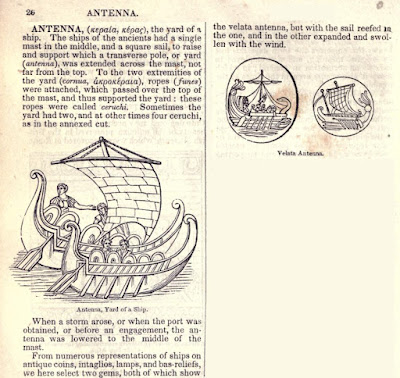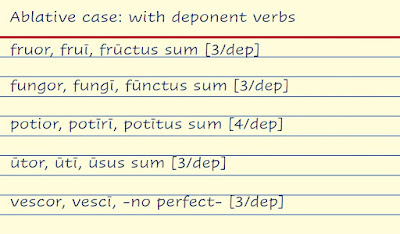[3]
The ancient
is placed in the stern. │ Signum (vēxillum) pōnitur in puppī.
On the mast is
the foretop, the watch-tower of the ship and on
the top … a vane, to shew which way the wind standeth.
In mālō est corbis,
specula nāvis et suprā … aplustre, ventōrum index.
[i] Comenius uses
the archaic English word ‘ancient’, a term in heraldry to refer to a flag or
banner or ensign:
signum, -ī [2/n]:
a very general word meaning ‘sign’ or ‘signal’, the phrase signō datō,
for example, meaning ‘after the signal had been given’ i.e. for battle to
commence; in military language it can also refer to the distinctive sign
(emblem, eagle, banner) of an army division
vēxillum, -ī
[2/n]: flag, banner, standard
[ii] corbis, -is
[3m/f]: basket
[iii] specula, -ae
[1/f]: lookout, watchtower
[iv] aplustre, -is
[3/n]: while Comenius refers to aplustre as a weather vane, the word described the
curved and ornamented wooden stern of a Roman ship
Image #1: aplustre
from From: A school dictionary of Greek and Roman antiquities (Smith,
William, Sir, 1813-1893)
[4]
The ship is stayed
with an anchor, │ nāvīs sistitur anc(h)orā,
the depth is
fathomed with a plummet, │profunditās explōrātur bolide,
passengers walk up and down the decks, │nāvigantēs
[participle: those (who are) sailing] dēambulant in tabulātō,
the sea men
run to and fro through the hatches, │nautæ cursitant per forōs,
and thus, even
seas are passed over. │ atque ita, etiam
maria trāiciuntur.
[i] Passives:
nāvis sistitur ¦
ancorā │ the ship is halted ¦ by an anchor
- sistō, -ere,
stitī, status [3]: stop, halt
profunditās
explōrātur │ the depth is explored (investigated, tested)
- profunditās,
profunditātis [3/f]: depth
maria trāiciuntur
│ seas are crossed over
[ii] bolis,
bolidis [3/f]: this is an interesting choice of word; Comenius refers to measuring
the depth of the water (and determining the characteristics of the sea floor) with
a sounding line or lead line, a thin length of rope to which a
lead weight – a plummet – is
attached. This was a simple and reliable tool used since the 5th
century BC, archaelogical discoveries showing that the method was employed by
Greek and Roman navigators.
sed posteāquam
quartādecimā nox supervēnit nāvigantibus nōbīs in Hadriā circā mediam noctem
suspicābantur nautae appārēre sibi aliquam regiōnem, quī submittentēs
invēnērunt passūs vīgintī et pusillum inde sēparātī invēnērunt passūs quīndecim
(Vulgate)
But after the
fourteenth night was come, as we were sailing in Adria, about midnight, the
shipmen deemed that they discovered some country, who also sounding [literally:
“lowering” i.e. a lead line], found twenty fathoms: and going on a little
further, they found fifteen fathoms.
Image #2: a
sailor and a man on shore both sounding the depth with a line; Olaus Magnus: On
the Vast Depths of the Norwegian Coasts (1554)
However, the word
itself – bolis, bolidis [3/f] – in Classical Latin refers specifically
to “a fiery meteor in the shape of an arrow”; Engl: bolide, an
exceptionally bright meteor; it is one of the words Pliny the Elder uses to
describe different types of meteor although it is difficult to establish precise
English equivalents. The Latin noun is from Greek βολίς (bolís), a javelin or
dart. I can only assume Comenius uses it owing to the pointed shape of a
lead plummet, or the way in which it rapidly and precisely strikes the water.
Image #3: plummet
or plumb bob of a Roman mason (1st – 3rd century
AD); the ones used by carpenters and masons do have a pointed end although the
ones used for depth sounding are normally in the shape of a bell; “plumb” is derived from Latin plumbum,
-ī [2/n]: lead, hence plumbārius, -ī [2/m]: plumber
līnea, -ae [1/f]: refers to any form of
line or string or thread, including fishing-line, and is also attested as referring
to a plumbline used by carpenters and masons
[iii] tabulātus,
-a, -um: boarded, having a floor > tabulātum, -ī [2/n]: flooring
- constrātum, -ī
[2/n]: any flooring made of planks; Petronius makes specific reference to constrātum
nāvis meaning the deck of a ship
[iv] forus, -ī
[2/m]: gangway of a ship; Comenius uses the word to refer to openings through
the deck of a ship
[v] cursitō, -āre
[1]: run around; this verb has a suffix: –(i)tō; this suffix denotes a frequentative
action i.e. one that is performed more than once:
- dictitō, -āre [1]:
repeat, maintain i.e. keep saying something
- clāmitō, -āre [1]:
yell i.e. not a single shout but a prolonged action
- vēnditō, -āre [1]:
offer something, again and again, for sale


















